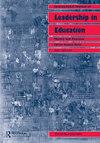Facets of school leadership: contributions of a phenomenological research approach
IF 2.5
Q1 EDUCATION & EDUCATIONAL RESEARCH
International Journal of Leadership in Education
Pub Date : 2023-09-18
DOI:10.1080/13603124.2023.2255583
引用次数: 0
Abstract
The impact of principalship on school effectiveness has become one of the central topics of school leadership research. Meanwhile, while it is assumed with some certainty that a relationship exists between leadership and student achievement, there is a lack of research on how school leadership and student learning are related. Particularly in German-speaking countries, only a few studies have been conducted in this area. This paper responds to this deficit and discusses the results of a recent research project conducted at 28 schools across Germany that won the German School Award. Using a phenomenological approach, the project investigates how school leadership action is reflected in successful schools. Observations and interviews with principals, teachers, and students were conducted during three-day site visits to each school. Grounded theory sensitized our data coding, which relied on inductively formulated categories that reflected ‘facets’ of leadership experiences. The different facets are presented in this paper from a phenomenological research perspective as a kind of ‘response register’. We propose that these can form the basis of a facet model for successful school leadership, and use empirical data to illustrate the applicability of the facets.学校领导的各个方面:现象学研究方法的贡献
校长对学校效能的影响已成为学校领导研究的中心议题之一。同时,虽然我们可以肯定地认为领导力与学生成绩之间存在一定的关系,但对于学校领导力与学生学习之间的关系的研究却很少。特别是在讲德语的国家,在这方面只进行了很少的研究。本文回应了这一缺陷,并讨论了最近在德国28所学校进行的一项研究项目的结果,该项目获得了德国学校奖。使用现象学方法,该项目调查了学校领导行动如何反映在成功的学校。在对每所学校进行为期三天的实地考察期间,对校长、教师和学生进行了观察和访谈。扎实的理论使我们的数据编码更加敏感,这些编码依赖于归纳制定的反映领导经验“方面”的类别。本文从现象学研究的角度,将这些不同的方面作为一种“反应记录”来呈现。我们提出,这些可以构成成功的学校领导方面模型的基础,并使用经验数据来说明方面的适用性。
本文章由计算机程序翻译,如有差异,请以英文原文为准。
求助全文
约1分钟内获得全文
求助全文
来源期刊

International Journal of Leadership in Education
EDUCATION & EDUCATIONAL RESEARCH-
CiteScore
5.10
自引率
14.30%
发文量
65
期刊介绍:
International Journal of Leadership in Education: Theory & Practice is an international journal for the publication of theoretical and practical discussions of educational leadership. The Journal presents: •cutting-edge writing on educational leadership, including instructional supervision, curriculum and teaching development, staff development, educational administration and more; •an alternative voice: reports of alternative theoretical perspectives, alternative methodologies, and alternative experiences of leadership; •a broad definition of leadership, including teachers-as-leaders, shared governance, site-based decision making, and community-school collaborations.
 求助内容:
求助内容: 应助结果提醒方式:
应助结果提醒方式:


